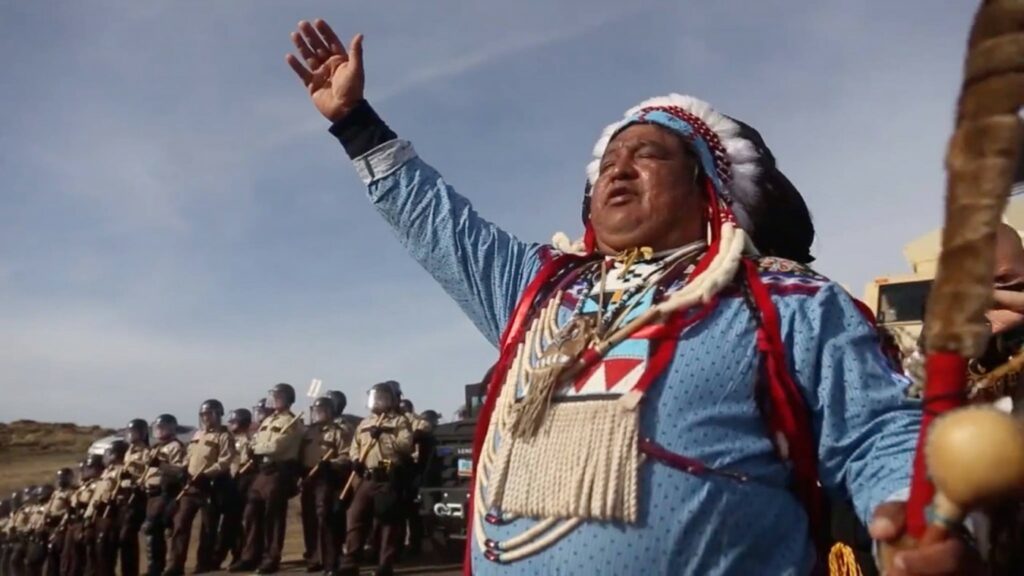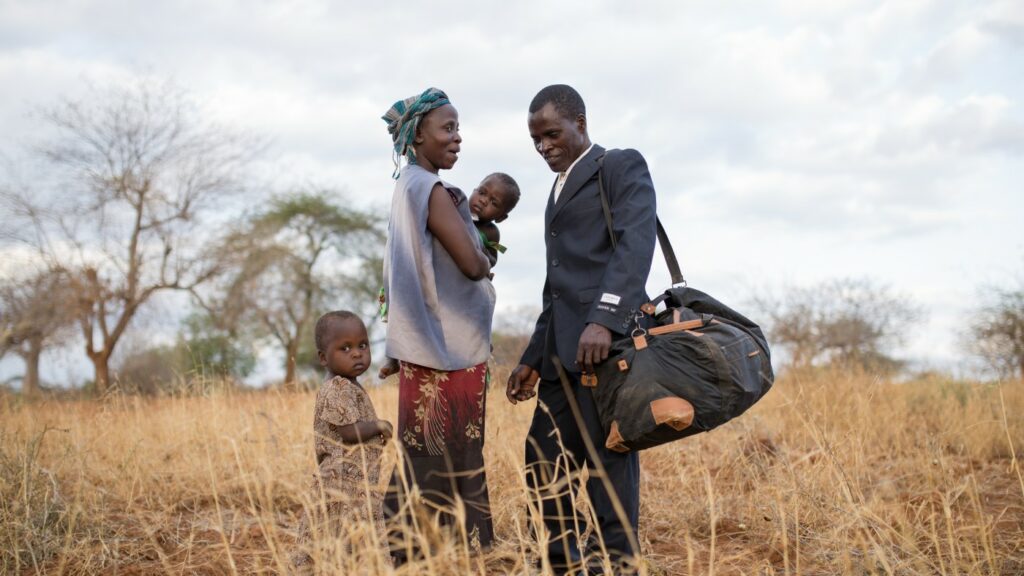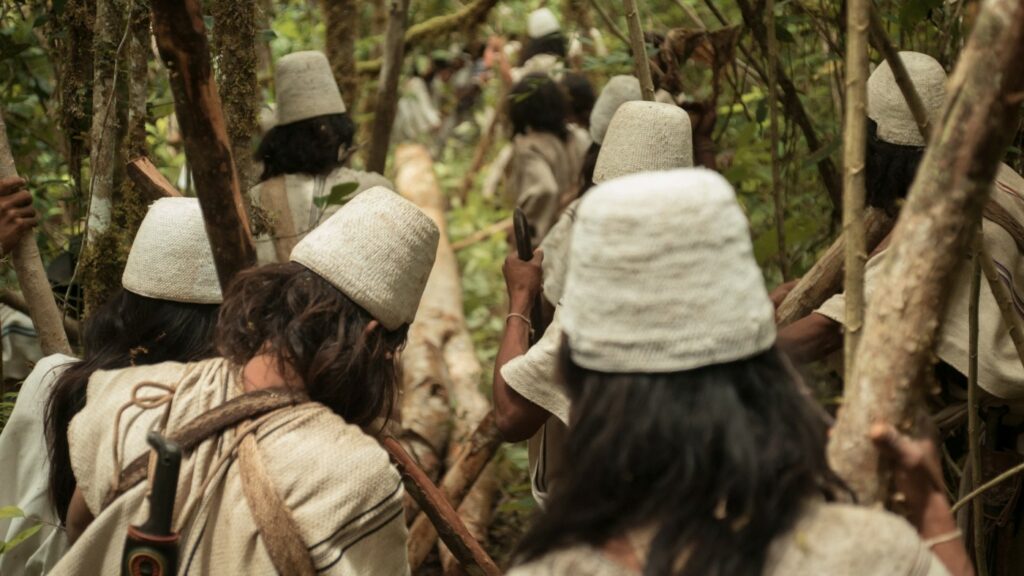Environmental activism, often led by indigenous communities, is a strong theme at this year’s RAI Film Festival. Our Festival Reporter recommends three to watch.
Awake, A View From Standing Rock

What’s it about?
The film documents the massive peaceful resistance led by the Standing Rock Sioux Tribe to the Dakota Access Pipeline through their land and underneath the Missouri River, a water source for over 18 million people. The ‘water protectors’ are faced with police brutality, mass arrests, unwarranted seizures of possessions and extreme criminal charges.
Who made it?
The film is a collaboration between Oscar nominated environmental filmmakers: Josh Fox and James Spione; and indigenous filmmakers: Director Myron Dewey and Executive Producer Doug Good Feather. Fox, Spione and Dewey each direct one of the film’s three parts.
What’s special about it?
The film is both an evocative visual poem – with accompanying passages of lyrical narration by native activist Floris White Bull that describe an urgent spiritual awakening – and an instructional piece on the principles and practicalities that such movements can be built upon.
Awake has a sophisticated visual language, which we might associate more with films like Barry Jenkins’ Moonlight than with documentary. From the opening sequence, in which a montage of glittering water imagery set to swirling strings is juxtaposed with footage of a burning river, smog filled skies and police attacking unarmed protesters with tear gas and bats, the film depicts a fundamental cultural dichotomy. White Bull professes: ‘On the one side; greed, fear, money, violence, hate and oil. And on the other; generosity, faith, freedom, peace and water’. Whilst images of proposed pipelines snaking all over the continent carry an ominous weight, the prominent roles that youth and social media play in galvanising and organising international protests serve as a promising counterpoint.
Awake, A Dream From Standing Rock screens 28 March at 13:15 at Watershed. Buy tickets here.
We are delighted that Executive Producer Doug Good Feather will attend this screening and take part in a Q&A.
Thank You For The Rain

What’s it about?
The film follows Kisilu Musya, a Kenyan farmer, as he tries to provide for his family amid the havoc wreaked on his home and livelihood by worsening droughts and floods. Kisilu recognises that climate change is responsible for the increasingly extreme weather, so sets about inspiring his community to ‘leave a legacy by planting trees’. His impressive commitment to this voluntary task earns him the opportunity to share his story at the Paris Climate Conference in 2015.
Who made it?
Up and coming Norwegian filmmaker Julia Dahr and Kisilu Musya share the credit for this film, as much of the footage is filmed by Kisilu himself. Using a small camcorder, Kisilu records and reflects on his everyday life and his efforts to have an impact in the fight for the climate.
What’s special about it?
Kisilu’s devotion to expanding his community’s attempts to combat climate change, despite the fact that it puts him under even more financial strain, is incredibly admirable. So, too, is his refusal to leave the village like many of his peers in search of work, instead aiming to take up taxi driving on top of his farm work so he can continue to live with his family. The grainy home footage that Kisilu shoots is intimate and endearing, capturing warm laughs and sombre reflections, whilst the contrast with Dahr’s brilliantly shot Kenyan landscapes mirrors the film’s exploration of the vastly varying scales at play in the international community. Kisilu’s musings on what makes a good father, and reports of the influence that his own troubled upbringing has had on his kind nature and firm moral ethos, root notions of duty to the younger generation in deeply personal subject matter.
Thank You For the Rain screens 30 March at 11:10 at Watershed. Buy tickets here.
Thinking Like a Mountain

What’s it about?
The film’s name is a term coined by highly influential 20th century environmentalist Aldo Leopold, referring to a holistic view of where one stands in relation to the interconnected elements of the ecosystem. The Arhuacos people are guardians of the Colombia’s highest mountain, Sierra Nevada de Santa Marta, and through self imposed isolationism they strive to preserve this environment and the profound, ecocentric spirituality they draw from it. Director Alexander Hick is given unprecedented access to their most remote communities, journeying through the mountain range with a young spiritual leader and learning of the colonisation, industrialisation, climate change and armed conflicts that threaten The Arhuacos’ sacred land and way of life.
Who made it?
Alexander Hick (San Agustin: Low Tide in The Plastic Sea, Atl Tiachinolli) founded Flipping The Coin Films, a production company that produces ‘independent documentary films that engage the question of cinematic authorship’, creating ‘works of art that escape clichéd categorizations and predictable market trends.’
What’s special about it?
Meditative montages of mountains, storms, caves and lagoons are accompanied by eerie woodwinds and smatterings of melodic percussion that blend with sounds of wind, water and deep creaking to evoke the thrum and jumbled harmony of the landscape. The film traces the Arhuacos’ history of resilience, from their encounter with the first colonising whites, to the homecoming of an Arhuaco guerrillero following the laying-down of arms by the FARC. Solemn stories of forced religious conversions, of a people drawn into conflict by the unexplained assassinations of their leaders, and a land contaminated by mass graves are intercut with breathtaking images of the mountain range and passages describing the Arhuacos’ passionate dedication to preserving it. The pride that the Arhuacos take in their unique cosmogony and integral relationship to the natural environment is palpable, and a stark contrast to the reporters and tourists that briefly peer at their culture through smartphones and cameras. A powerful rumination on ‘that which soon will no longer exist, but whose gravity penetrates all.’
Thinking Like a Mountain screened on 28 March 2019 at 11:00 at Watershed.